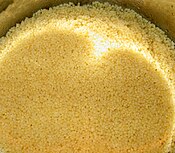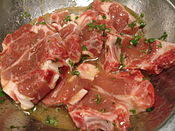Western Saharan cuisine: Difference between revisions
Funandtrvl (talk | contribs) →External links: nvbx |
No edit summary |
||
| Line 1: | Line 1: | ||
[[File:LocationWesternSahara.svg|thumb|Location of [[Western Sahara]]]] |
[[File:LocationWesternSahara.svg|thumb|Location of [[Western Sahara]]]] |
||
[[File:Kaja1.jpg|thumb|<center>Saharawi Cuisine</center>]] |
|||
[[File:Pan Saharaui.jpg|thumb|<center>Sahrawi bread</center>]] |
|||
'''Western Saharan cuisine''' comprises the [[cuisine]] of [[Western Sahara]], a [[disputed territory]] in the [[Maghreb]] region of [[North Africa]], bordered by [[Morocco]] to the north, [[Algeria]] to the extreme northeast, [[Mauritania]] to the east and south, and the [[Atlantic Ocean]] to the west. |
'''Western Saharan cuisine''' comprises the [[cuisine]] of [[Western Sahara]], a [[disputed territory]] in the [[Maghreb]] region of [[North Africa]], bordered by [[Morocco]] to the north, [[Algeria]] to the extreme northeast, [[Mauritania]] to the east and south, and the [[Atlantic Ocean]] to the west. |
||
| Line 8: | Line 10: | ||
As of 2012, all economic activity and trade in Western Sahara is governed by the [[government of Morocco]].<ref name="Ibpus"/> |
As of 2012, all economic activity and trade in Western Sahara is governed by the [[government of Morocco]].<ref name="Ibpus"/> |
||
The Western Saharan cuisine has several influences, as the population of that area ([[Saharawi]]), in their most part is [[Arab people|Arabic]] and [[Berber Ethnicity|Berber]] origin. The Saharawi cuisine is influenced by the Spanish occupation. |
|||
The main ingredient is the [[couscous]] that often accompanies one way or another all the food dishes. The influences of southern cuisine makes them consume [[peanut]] as an accompaniment of some dishes. |
|||
In the field of meat, the pig just eats by not be [[halal]], in accordance with the laws of [[Islam]] and, on the contrary, is very popular among the Sahrawis the [[camel]] and [[goat meat|goat]] meal, occupying a prominent place, of the lamb. Some tribes are famous for growing wheat, barley and cereals in general, and for make delicious dishes. |
|||
==Common foods and dishes== |
==Common foods and dishes== |
||
Being almost entirely nomadic, the diet of Saharan tribes, was based on the [[meat]], [[milk]] and [[dairy|derivatives]]. The coastal tribes added to this diet fish dishes, [[rice]] and so on. |
|||
| ⚫ | |||
| ⚫ | |||
| ⚫ | |||
**Made solely from [[Dromedary|Dromedaries]] |
**Made solely from [[Dromedary|Dromedaries]] |
||
| ⚫ | |||
* [[Goat meat]] <ref name="PBS"/> |
* [[Goat meat]] <ref name="PBS"/> |
||
* ''Meifrisa'' is a traditional dish of the region.<ref name="Foodspring"/> It's a [[stew]] prepared with [[Lamb and mutton|lamb]] or camel meat, onion, and garlic, served atop [[unleavened bread]].<ref name="Foodspring"/> |
* ''Meifrisa'' is a traditional dish of the region.<ref name="Foodspring"/> It's a [[stew]] prepared with rabbit, [[Lamb and mutton|lamb]] or camel meat, onion, and garlic, served atop [[unleavened bread]] cooked in the sand.<ref name="Foodspring"/> |
||
* Ezzmit, cereals. |
|||
* El aych, [[cereal]]s with milk. |
|||
* Arroz con pescado. |
|||
* Various types of roasts. |
|||
<gallery class="center" caption="" widths="175px" heights="175px"> |
<gallery class="center" caption="" widths="175px" heights="175px"> |
||
| Line 22: | Line 36: | ||
==Beverages== |
==Beverages== |
||
[[File:Te Saharaui.JPG|thumb|<center> Saharawi Tea </ center>]] |
|||
[[File:HALIB.jpg|thumb|Fresh [[camel milk]]]] |
[[File:HALIB.jpg|thumb|Fresh [[camel milk]]]] |
||
* It is very usual intake of [[tea]]. Tea is more than just a drink for the Saharawi people is a way to meet and share moments with friends and family moments of chat and friendship. |
|||
It usually follows a ritual, in which are taken three vessels. In this regard, there is a popular comment: "''The first glass of tea is bitter like life, the second cup sweet like love and the third soft as death.''"<ref name="IMB"/> |
|||
* [[Camel milk]] <ref name="FAO"/> |
* [[Camel milk]] <ref name="FAO"/> |
||
** milked solely from [[Dromedary|Dromedaries]] |
** milked solely from [[Dromedary|Dromedaries]] |
||
* [[Goat#Milk, butter and cheese|Goat milk]] <ref name="Rézette"/> |
* [[Goat#Milk, butter and cheese|Goat milk]] <ref name="Rézette"/> |
||
* [[Tea]] <ref name="IMB"/> |
|||
:* Imported [[green tea]], flavored with [[spearmint]] and [[sugar]] <ref name="NPR"/> |
|||
:* [[Maghrebi mint tea|Mint tea]] <ref name="Shelley"/> |
|||
==See also== |
==See also== |
||
| Line 72: | Line 86: | ||
* [http://www.virtualtourist.com/travel/Africa/Western_Sahara/Restaurants-Western_Sahara-MISC-BR-1.html "Places to eat in Western Sahara"]. Virtual Tourist. |
* [http://www.virtualtourist.com/travel/Africa/Western_Sahara/Restaurants-Western_Sahara-MISC-BR-1.html "Places to eat in Western Sahara"]. Virtual Tourist. |
||
{{Western Sahara topics}} |
|||
{{african cuisine}} |
{{african cuisine}} |
||
{{cuisines}} |
{{cuisines}} |
||
| Line 79: | Line 94: | ||
[[Category:Sahrawi culture]] |
[[Category:Sahrawi culture]] |
||
[[Category:Western Sahara]] |
[[Category:Western Sahara]] |
||
[[es:Gastronomía del Sahara Occidental]] |
|||
Revision as of 20:10, 17 August 2015



Western Saharan cuisine comprises the cuisine of Western Sahara, a disputed territory in the Maghreb region of North Africa, bordered by Morocco to the north, Algeria to the extreme northeast, Mauritania to the east and south, and the Atlantic Ocean to the west.
Food is primarily imported into Western Sahara, as minimal rainfall in the territory inhibits agricultural production.[1] Indigenous sources of food include those derived from fishing and nomadic pastoralism.[1][2] The labor and business in these indigenous provisions of foods are also a primary contributor of income for the territory's population, and are among the primary contributors to the economy of Western Sahara.[1][2]
Some fruits and vegetables are grown in oases that are scattered within the territory.[2]
As of 2012, all economic activity and trade in Western Sahara is governed by the government of Morocco.[2]
The Western Saharan cuisine has several influences, as the population of that area (Saharawi), in their most part is Arabic and Berber origin. The Saharawi cuisine is influenced by the Spanish occupation.
The main ingredient is the couscous that often accompanies one way or another all the food dishes. The influences of southern cuisine makes them consume peanut as an accompaniment of some dishes.
In the field of meat, the pig just eats by not be halal, in accordance with the laws of Islam and, on the contrary, is very popular among the Sahrawis the camel and goat meal, occupying a prominent place, of the lamb. Some tribes are famous for growing wheat, barley and cereals in general, and for make delicious dishes.
Common foods and dishes
Being almost entirely nomadic, the diet of Saharan tribes, was based on the meat, milk and derivatives. The coastal tribes added to this diet fish dishes, rice and so on.
- Couscous, meal paste, with meat and vegetables[3][4]
- * Tajín, camel meat [5][6][7]
- Made solely from Dromedaries
- Goat meat [6]
- Meifrisa is a traditional dish of the region.[8] It's a stew prepared with rabbit, lamb or camel meat, onion, and garlic, served atop unleavened bread cooked in the sand.[8]
- Ezzmit, cereals.
- El aych, cereals with milk.
- Arroz con pescado.
- Various types of roasts.
Beverages

- It is very usual intake of tea. Tea is more than just a drink for the Saharawi people is a way to meet and share moments with friends and family moments of chat and friendship.
It usually follows a ritual, in which are taken three vessels. In this regard, there is a popular comment: "The first glass of tea is bitter like life, the second cup sweet like love and the third soft as death."[3]
- Camel milk [9]
- milked solely from Dromedaries
- Goat milk [10]
See also
- African cuisine
- Culture of Western Sahara
- History of Western Sahara
- List of ecoregions in Western Sahara
- Oases of Western Sahara (category)
- List of African cuisines
- List of African dishes
- List of rivers in Western Sahara
- Moroccan cuisine
- North African cuisine
- Sub-Saharan Africa
- West African cuisine
- Wildlife of Western Sahara
References
- ^ a b c The World Factbook 2008
- ^ a b c d Western Sahara Business Law Handbook: Strategic Information and Laws - Ibpus.com, International Business Publications, USA
- ^ a b International Mission Board: News & Information
- ^ Endgame in the Western Sahara: What Future for Africa's Last Colony? - Toby Shelley. pp. 82-83.
- ^ Camel Meat and Meat Products
- ^ a b The 37-year-old refugee situation you know nothing about | PBS NewsHour
- ^ Western Sahara: Anatomy of a Stalemate - Erik Jensen. p. 23.
- ^ a b "Western Sahara". Foodspring.
- ^ The next thing: camel milk
- ^ The Western Sahara and the Frontiers of Morocco - Robert Rézette. pp. 25-33.
Further reading
- Crossette, Barbara (June 9, 2001). "World Briefing, Africa: Western Sahara: Refugees Need Food". The New York Times. Retrieved 29 January 2014.
{{cite web}}: Italic or bold markup not allowed in:|publisher=(help) - Sahara Press Service (February 3, 2013). "Morocco: Swedish Food Chains Unite in Avoiding Occupied Western Sahara's Goods". All Africa. Retrieved 29 January 2014.
- Sahara Press Service (April 16, 2013). "Western Sahara: Over 20 Tonnes of Food Aid to Saharawi Refugees". All Africa. Retrieved 29 January 2014.
External links
- "Places to eat in Western Sahara". Virtual Tourist.

